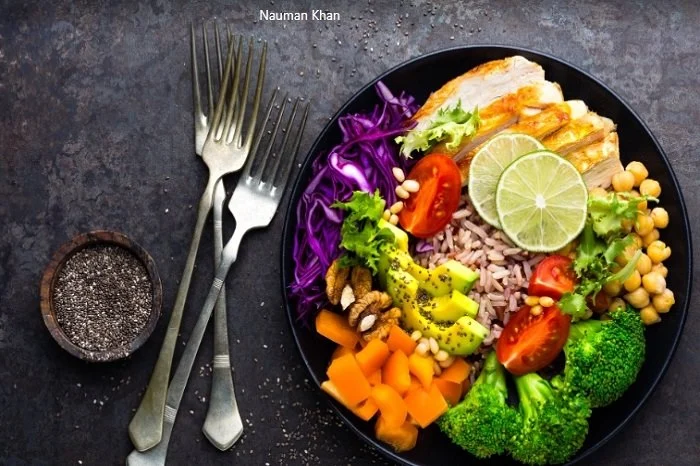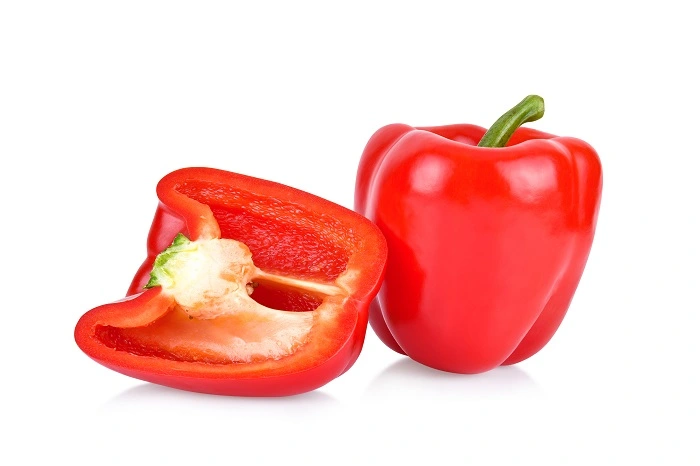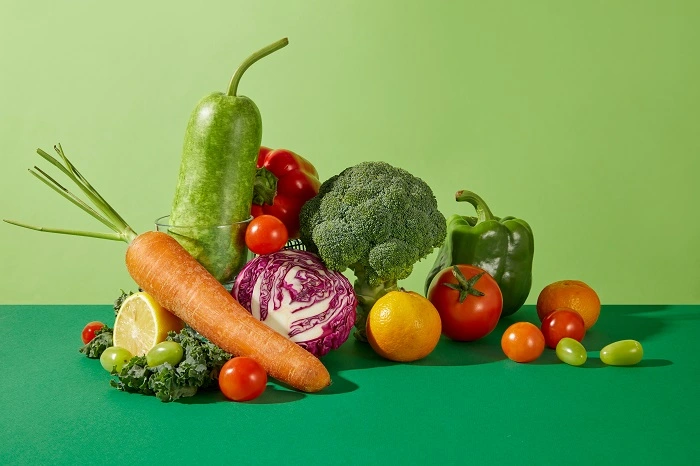1. Broccoli
Nature's ultimate health booster and anti-cancer vegetable
2. Bell pepper
Packed with Vitamin C: Your Pathway to Vibrant Health and Wellness
3. Onion
Improve your gut health and Prevent Cancer
4. Avocado
Creamy avocados: Nature healthy heart fat source
5. Spinach
Spinach: The green powerhouse for every diet
Vegetables are the best in terms of health benefits. According to scientific research, vegetables are beneficial for your health. Vegetables reduce your chances of cancer and diabetes and increase your life longing. In fact, researchers believe that eating a lot of vegetables may reduce your chances of developing cancer, heart disease, or type 2 diabetes.
Almost every vegetable benefits your health, but some are exceptionally so. Some vegetables benefit your health in various ways due to the unique nutrients they contain.
Cooking and preparing vegetables in various ways could change their nutritional value. Steaming the meal can increase its nutritional value, and boiling or freezing can reduce it.
Let'sdiscuss the top 5healthiest vegetables for your health and the benefits they provide.
Top 5 Most Healthy Vegetables
The best 5healthiest vegetables are listed below:
1. Broccoli
Nature's ultimate health booster and anti-cancer vegetable
 Bok choy, Brussels sprouts, and cabbage all belong to the same family as broccoli. Broccoli is one of the healthiest vegetables, so beneficial that it is referred to as a "superfood."
Bok choy, Brussels sprouts, and cabbage all belong to the same family as broccoli. Broccoli is one of the healthiest vegetables, so beneficial that it is referred to as a "superfood."
Broccoli contains a high fiber concentration, vitamins A, C, and K, iron, potassium, calcium, and vitamin K. It also has excellent anti-inflammatory, cancer, and antioxidant properties. Whether eaten raw or cooked, broccoli provides a lot of greens.
According to scientists, broccoli has a bitter taste because it has a high concentration of the nutrient sulforaphane. Sulforaphane has been found to protect against a variety of cancers, including colon and lung cancer. Eat broccoli more frequently as part of your diet.
Cruciferous vegetables contain an organic compound known as indole glucosinolate. Some research suggests that it may affect thyroid hormones. However, we need more information to determine the exact amount of this potentially harmful food.
Much research has focused on the health benefits of sulforaphane, a unique molecule found in broccoli. Some research suggests that bitter vegetables, such as broccoli, are the greatest method to avoid cancer. Broccoli also contains plenty of iron and vitamin C.
Health Benefits of Broccoli
- Broccoli is full of vitamins, minerals, and bioactive compounds;
- It contains powerful antioxidants that are good for your health;
- Bioactive compounds may help reduce inflammation;
- Antioxidants and fiber may help control blood sugar;
- May support heart health in several ways;
- May help slow mental decline and maintain healthy brain function;
- May help slow down the ageing process;
- Vitamin C content supports a healthy immune system;
- May support dental health.
2. Bell pepper
Packed with Vitamin C: Your Pathway to Vibrant Health and Wellness
 Bell peppers are the healthiest fruits commonly used as vegetables. In addition to green, theycome in yellow, orange, and red. Although the colors contain slightly varied amounts of nutrients, they are rich.
Bell peppers are the healthiest fruits commonly used as vegetables. In addition to green, theycome in yellow, orange, and red. Although the colors contain slightly varied amounts of nutrients, they are rich.
Bell peppers have a high amount of vitamin C, essential for a healthy nervous system. You can consume a lot of bell peppers because they are high in protein and vitamin A, both of which are beneficial to your eyes.
Bell peppers contain numerous bioactive compounds that can fight cancer, diabetes, fungus, free radicals, and bacteria. They also help the body's defenses.
They come in three colors, each with its own benefits. Eating a range of colored foods will ensure your body receives all the necessary nutrients.
- Red peppers:Capsaicin, found in red peppers, can help treat pain, prevent cancer, and help people lose weight.
- Yellow peppers: Due to their high flavonoid content, they are an excellent food for memory and retention.
- Green peppers: They contain a lot of phosphoric acids. This can protect your skin from injury and reduce your diabetes risk.
A cup of bell peppers contains roughly three times more vitamin C than an orange. This makes them a particularly vitamin C-rich diet.
Health Benefits of Bell Peppers
- Heart and digestive health benefits
- Eye health enhancement
- Potassium richness
- Wrinkle reduction
- Antioxidant richness
3. Onion
Improve your gut health and Prevent Cancer
 How often do you eat onions? If not, it would be good of you too. All three forms of onions—shallots, spring onions, and leeks—are strong in fiber and, therefore, suitable for our digestive system.
How often do you eat onions? If not, it would be good of you too. All three forms of onions—shallots, spring onions, and leeks—are strong in fiber and, therefore, suitable for our digestive system.
Onions are helpful to your health in a variety of ways. Some of their functions include reducing inflammation, killing germs, and protecting cells from injury. They may also prevent you from developing diabetes, cancer, or heart disease. In addition, they benefit the digestive, immunological, and reproductive systems.
Onions contain quercetin, a powerful antioxidant that benefits the heart in various ways. An onion includes five to ten times the amount of quercetin as other vegetables, making it an excellent diet for preventing heart disease.
Onions are another excellent method to enhance flavor while still being healthy. Onions benefit your neurological system and can aid with inflammation and free radicals. In this way, they help your health in numerous ways. When onions are used frequently
Researchers have conducted extensive research on allium vegetables about cancer, particularly colorectal and stomach cancers. Onions are an excellent source of iron, protein, and calcium.
Health Benefits of Onions
- Due to their high vitamin C content, onions may aid in producing and maintaining collagen, which plays a significant role in the construction of both skin and hair.
- Researchers discovered that consuming the quercetin component of onion skin as a vitamin or extract reduced blood pressure.
- Could improve gut health
- Could be beneficial for your eyes
- Could make certain kinds of cancer less likely to occur.
4. Avocado
Creamy avocados: Nature healthy heart fat source
 Avocados are so popular that they are easily accessible in most supermarket stores. Avocados are among the few fruits (also referred to as healthiest fruits, not vegetables) that contain a high concentration of beneficial saturated fats. These are primarily monounsaturated fatty acids. Polyunsaturated fats have also been linked to improved heart, brain, and eye health. Avocados contain vitamins C, E, K, and B6, potassium, and calcium.
Avocados are so popular that they are easily accessible in most supermarket stores. Avocados are among the few fruits (also referred to as healthiest fruits, not vegetables) that contain a high concentration of beneficial saturated fats. These are primarily monounsaturated fatty acids. Polyunsaturated fats have also been linked to improved heart, brain, and eye health. Avocados contain vitamins C, E, K, and B6, potassium, and calcium.
Avocados are excellent for you, but eating too many may cause weight gain due to their high calorie and natural fat content.
Health Benefits of Avocado
- Promotes weight loss: This is the best vegetable to eat daily for weight loss since it contains beneficial fibers. Avocados not only help you lose weight but also contain nearly no carbohydrates.
- Maintain a heart-healthy lifestyle: Avocados contain beta-sitosterol, a type of plant sterol. Regular consumption of plant sterols, such as beta-sitosterol, can help maintain normal cholesterol levels and keep the heart's veins and vessels healthy.
- Improves digestive system: Avocados have a lot of fiber, which helps keep your digestive tract healthy. Fiber improves digestion by making stools larger, allowing you to go to the bathroom more frequently. Furthermore, they can help prevent heartburn, constipation, and colon cancer.
- Essential for a healthy pregnancy: Avocados contain a lot of folates, which is vital for pregnant women because it promotes proper baby growth and development while also lowering the chance of miscarriage and neural tube problems.
- Keeps your skin shiny: Avocados have numerous health benefits, including fatty acids, vitamins, minerals, and antioxidants. So, they are critical for skin health. They also contain many vitamins, C and E, which will help your skin shine even more.
5. Spinach
Spinach: The green powerhouse for every diet
 Spinach is the fullest of nutrients ingreen leafy food. It contains significant levels of vitamins A, B, and K. It includes a variety of minerals, including iron, magnesium, manganese, calcium, and iron. It contains several beneficial elements, including protein, fiber, and amino acids.
Spinach is the fullest of nutrients ingreen leafy food. It contains significant levels of vitamins A, B, and K. It includes a variety of minerals, including iron, magnesium, manganese, calcium, and iron. It contains several beneficial elements, including protein, fiber, and amino acids.
Spinach can help fight cancer and maintain healthy blood sugar and cholesterol levels. Eating spinach every day is probably not a good idea because it prevents your body from absorbing calcium and magnesium, which might cause kidney stones. Because it contains a high concentration of vitamin K, it may interact negatively with several blood additives.
Health Benefits of Spinach
- Prevents cancer: Spinach contains antioxidants and zeaxanthin, which help combat harmful free radicals.
- Promotes Weight Loss: Spinach leaves have several health benefits, so including them in your weight loss diet is a fantastic sliming option. This natural, low-calorie green marvel also promotes weight loss.
- Lowers blood pressure: taking it daily can help you relax and deal with stress. Spinach contains vitamin C, which can help decrease blood pressure.
- Improves your immune system: Spinach's vitamin A level is supposed to enhance the body's entrance points, including the gastrointestinal, respiratory, and mucous membrane systems, improving immunity.
- PreventAtherosclerosis and Heart Attacks: Consuming spinach daily can help prevent atherosclerosis and heart attacks. This is due to lutein, a substance that prevents your airways from becoming too thick.
Spinach also has one of the highest iron contents of any vegetable. It also contains plenty of fiber and vitamin A.
Which nutrients do vegetables provide?
Vegetables contain several nutrients your body requires, including potassium, fiber, folate (folic acid), and vitamins A, E, and C. Eating more vegetables will keep you healthier. These nutrients are necessary for the body's systems to function correctly. Plant-based diets can provide many of the nutrients your body needs. Here are some of them:
- Fiber: One of the many advantages of high-fiber diets is that they reduce the risk of coronary heart disease.
- Potassium: Muscles and neurons require potassium to function correctly. Potassium can also help regulate blood pressure and reduce the chance of having a stroke.
- Folate: Folate is a substance that helps the body produce red blood cells. Pregnant mothers should take extra folate to reduce their baby's risk of developing brain or spinal cord abnormalities.
- Vitamin A: Helps keep your skin and eyes healthy and prevents infections.
- Vitamin C: It promotes wound healing and maintains healthy teeth and gums.
- Iron: The brain and red blood cells cannot function without iron in the body.
- Calcium: Calcium helps your bones and teeth stay strong. Without it, muscles, nerves, and glands cannot function properly. Calcium may also reduce the risk of developing cancer, diabetes, or high blood pressure.
- Phytonutrients: Plant-derived nutrients are referred to as phytonutrients. They are beneficial to your health in a variety of ways. Antioxidants are one example of anything that may help prevent cancer and heart disease.
The Environmental Impact of Eating More Vegetables
It may surprise you to learn that eating more vegetables benefits you and the entire world and its inhabitants. Diets made without animals are indeedbetter for the environment than ones that include animal products.
Farming may harm the environment in two ways: it depletes natural resources and emits additional greenhouse gases into the atmosphere. Eating more veggies can help reduce food waste because they require less packaging and last longer.
Using less single-use plastic packaging is possible if you consume more fresh vegetables than processed foods. Another thing you can do to help the environment is to eat more plant-based meals rather than those high on meat or animals.
Final Thought
It is well-accepted that eating the healthiest vegetables and fruits daily is beneficial to one's health. The top 5 healthiest vegetables – broccoli, bell pepper, onion, avocado, and spinach- offer various health benefits and nutrients. Not only do they reduce your risk of contracting certain diseases, but they can also help your body function properly. Eat at least two bowls daily for the best health benefits. However, you don't have to start huge. Eating one vegetable each day can help. Eating a range of colors is a fun and nutritious way to eat because each color contains unique nutrients.






